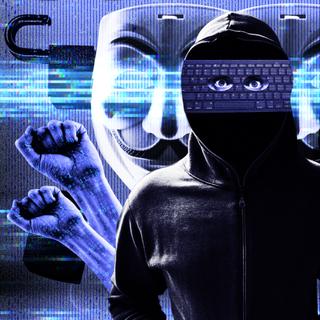


The new era of hacktivism
In DepthThis form of online activism, popularized by Anonymous, has been making a strong comeback in recent years. Its growth has notably been driven by governments, who see it as an ideal way of operating undercover.
On August 27, three days after the arrest of Telegram CEO Pavel Durov, a strange channel on the messaging platform announced that it had "defaced" the homepages of several French websites. Using the keyword #FreeDurov, the group known as Stucx Team claimed to have hacked several French sites, in a show of support for the French-Russian dual citizen.
In the same post, the online collective, whose feats have been of relative importance, thanked its "brothers in arms," other groups with equally evocative names: Moroccan Black Cyber Army, Holy League, Khalifa Cyber Crew and Ripper Sec. Stucx Team, which has described itself as a coalition of Muslim activists from Malaysia, is just the tip of the iceberg: In recent years, several IT security companies and experts have observed a resurgence of hacktivism, a term created as a contraction of "hacker" and "activism," a form of online activism popularized by Anonymous.
NoName057, Anonymous Sudan, Philippines Exodus Security, Indian Cyber Force: It has become hard to make sense of the jungle of names that have proliferated, particularly on the messaging platform Telegram. It is difficult, too, to assess their real impact.
A new surge
Indeed, many of these groups have claimed responsibility for unsophisticated actions. The specialized firm Group IB has analyzed the activity of Mysterious Team Bangladesh, a group of hacktivists with "political and religious" motivations, who have, since 2020, notably targeted India and Israel. The company determined that almost 90% of the actions the collective has claimed responsibility for were simple direct denial-of-service (DDoS) attacks. The rest of the claimed actions consisted of defacements, i.e., modifying the homepages of websites that are generally poorly secured. Another major modus operandi of this new generation of groups is known as "hack and leak," i.e., the dissemination of confidential information and stolen documents, which are mostly unverifiable.
These methods would represent a direct "legacy of Anonymous," according to American researcher Gabriella Coleman, a specialist on the informal collective that became prominent in the early 2010s, and which has since faded into obscurity. Yet why, all of a sudden, are new factions claiming to operate via this independent mode of action?
Paradoxically, the first place to look for this information might be among state actors, as exemplified by the Handala collective. On September 18, the day after thousands of pagers belonging to Hezbollah members exploded in Lebanon and Syria, the collective promised to reveal the truth about the attack, and began distributing documents. These documents, the authenticity of which Le Monde has been unable to verify, have been described as having been stolen from companies that collaborated with Israeli intelligence services to carry out the pager-bombing operation.
You have 64.11% of this article left to read. The rest is for subscribers only.
